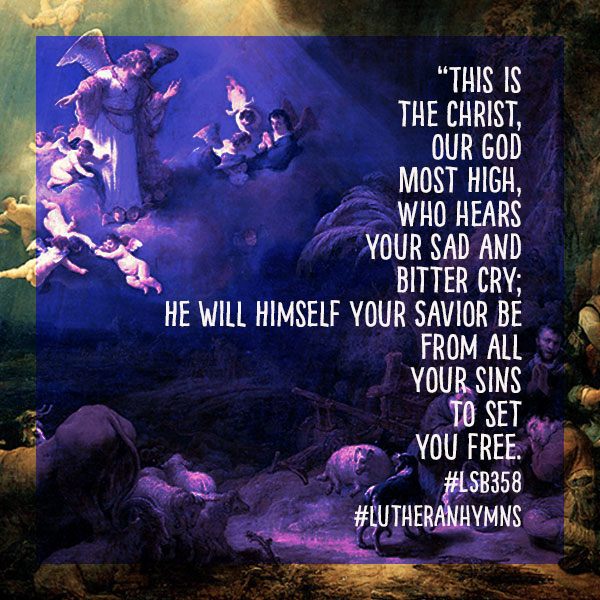From Heaven Above To Earth I Come
“Luther wanted to give his children memorable Christmas celebrations, so he would arrange to have a man show up at his house dressed up as an angel, who sang the first seven verses of the hymn.”
About this setting of the hymn:
Written by Martin Luther (1483-1546) and translated by Catherine Winkworth (1827-1878), this carol begins with the angelic proclamation of Christ's birth and ends with a worshipful human response inviting Jesus to abide within the "quiet chamber" of the heart. In this new setting, verses selected from the original text alternate with the refrain "Gloria, the Christ is born."
Luther wrote several fantastic Christmas hymns, but I include this one because it is probably the most familiar to our congregations already. A beautiful story goes along with this hymn. Luther wanted to give his children memorable Christmas celebrations, so he would arrange to have a man show up at his house dressed up as an angel, who sang the first seven verses of the hymn. Luther’s children in lively fashion would respond by singing the remaining verses. The story of this hymn gives us a peek into Luther’s fatherly heart. More importantly, it teaches us the Christmas story in ways which are doctrinal, devotional, and touching all at the same time. On this sacred and happy festival, Luther’s hymn deserves to be sung in Lutheran congregations and homes. We are shortchanging our children without it.
What’s your favorite Lutheran hymn? Let us know with a comment below.
Lutheran Service Book, Hymn 358
The Lutheran Hymnal, Hymn 85
Text: Luke 2: 1-18
Author: Martin Luther, 1535
Tune: Vom Himmel hoch, da komm' ich her
Translated by: Catherine Winkworth, 1855
First published in: "Geistliche Lieder" Leipzig, 1539
Lyrics
“From heav’n above to earth I come
To bear good news to ev’ry home;
Glad tidings of great joy I bring,
Whereof I now will say and sing:
“To you this night is born a child
Of Mary, chosen virgin mild;
This little child of lowly birth
Shall be the joy of all the earth.
“This is the Christ, our God Most High,
Who hears your sad and bitter cry;
He will Himself your Savior be
From all your sins to set you free.
“He will on you the gifts bestow
Prepared by God for all below,
That in His kingdom, bright and fair,
You may with us His glory share.
“These are the signs that you shall mark:
The swaddling clothes and manger dark.
There you will find the infant laid
By whom the heav’ns and earth were made.”
How glad we’ll be to find it so!
Then with the shepherds let us go
To see what God for us has done
In sending us His own dear Son.
Come here, my friends, lift up your eyes,
And see what in the manger lies.
Who is this child, so young and fair?
It is the Christ Child lying there.
Welcome to earth, O noble Guest,
Through whom the sinful world is blest!
You came to share my misery
That You might share Your joy with me.
Ah, Lord, though You created all,
How weak You are, so poor and small,
That You should choose to lay Your head
Where lowly cattle lately fed!
Were earth a thousand times as fair
And set with gold and jewels rare,
It would be far too poor and small
A cradle for the Lord of all.
Instead of soft and silken stuff
You have but hay and straw so rough
On which as King, so rich and great,
To be enthroned in royal state.
And so it pleases You to see
This simple truth revealed to me:
That worldly honor, wealth, and might
Are weak and worthless in Your sight.
Ah, dearest Jesus, holy Child,
Prepare a bed, soft, undefiled,
A quiet chamber set apart
For You to dwell within my heart.
My heart for very joy must leap;
My lips no more can silence keep.
I, too, must sing with joyful tongue
That sweetest ancient cradlesong:
Glory to God in highest heav’n,
Who unto us His Son has giv’n!
While angels sing with pious mirth
A glad new year to all the earth.
Text: Public domain

